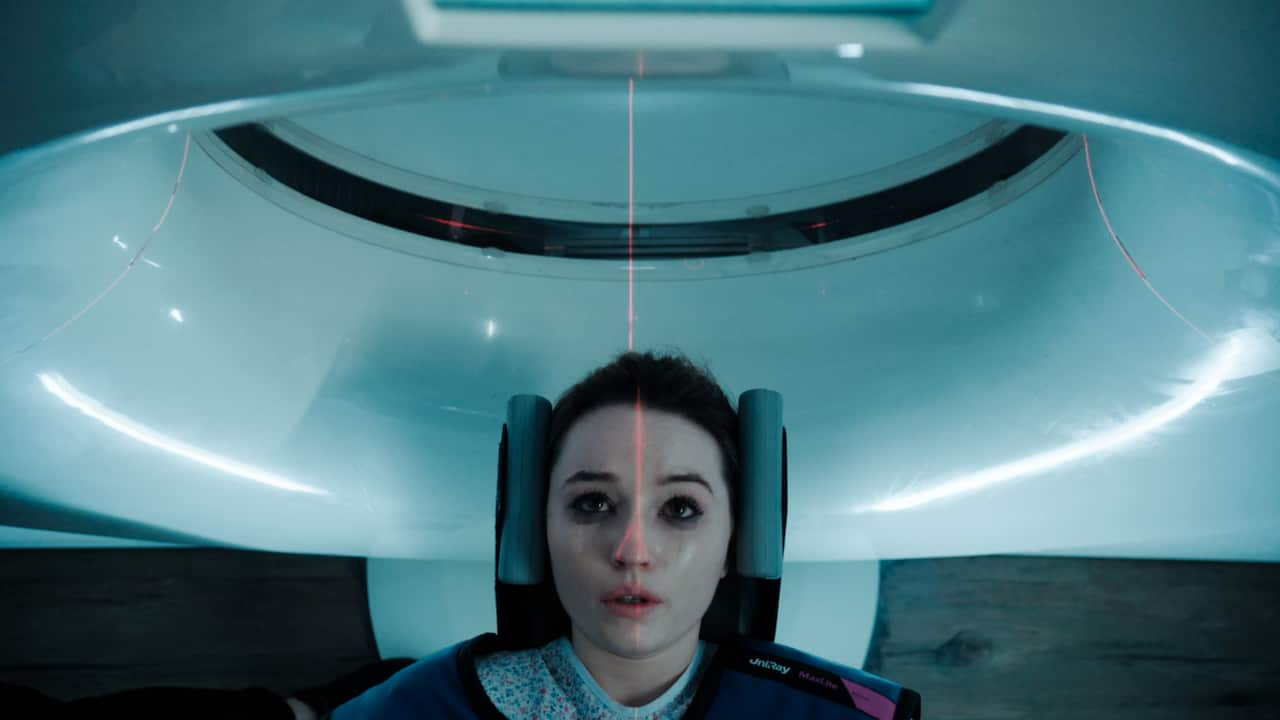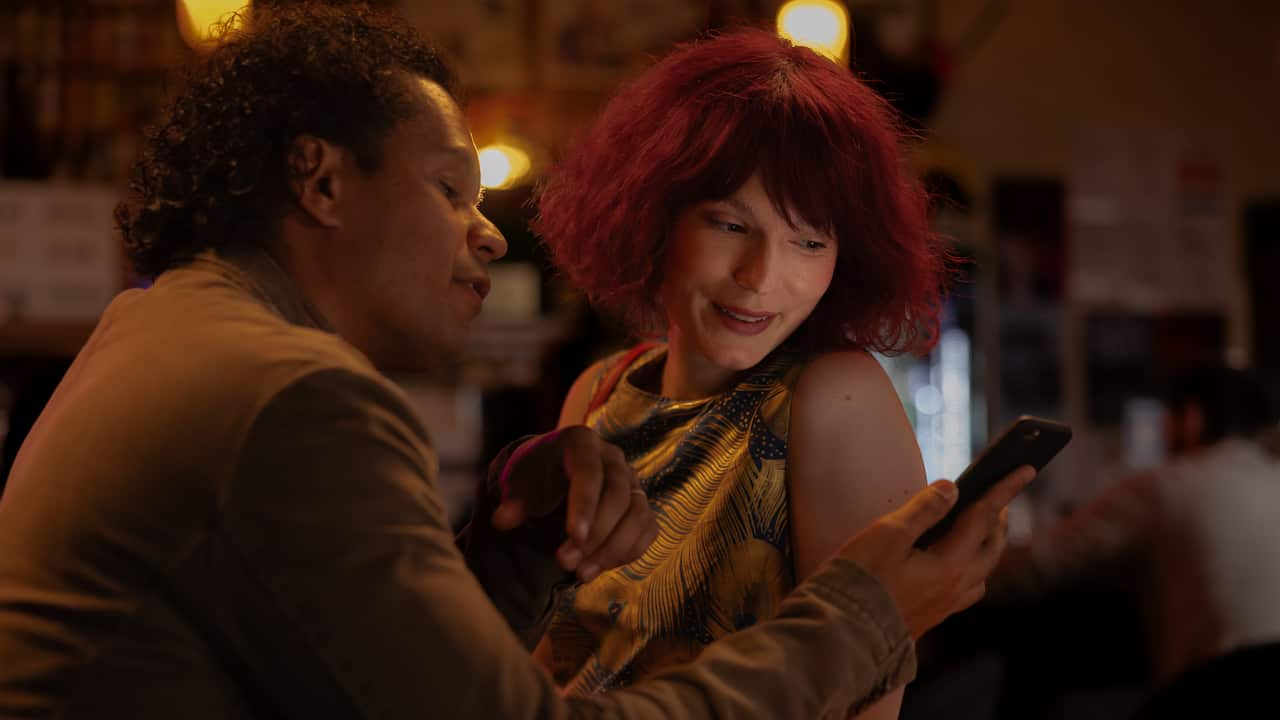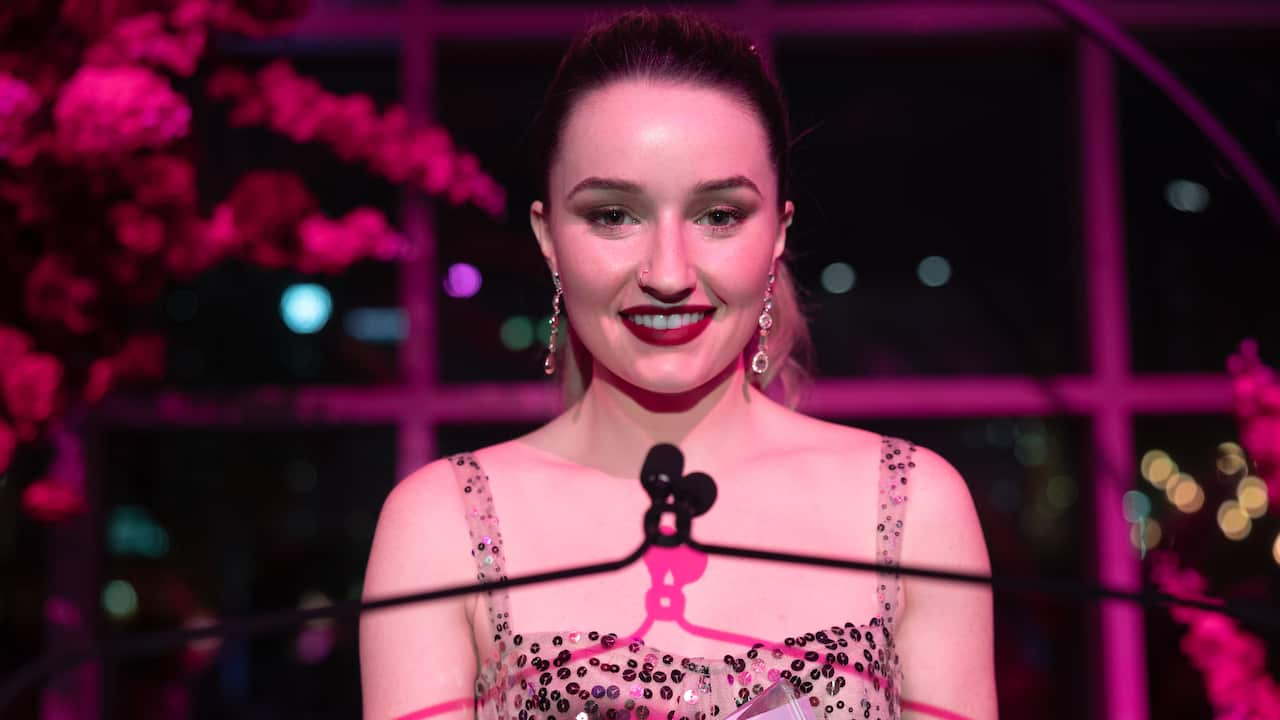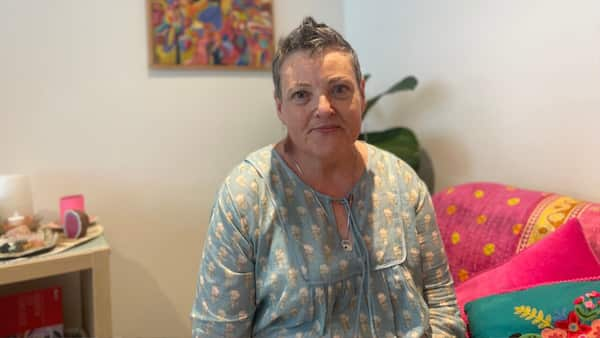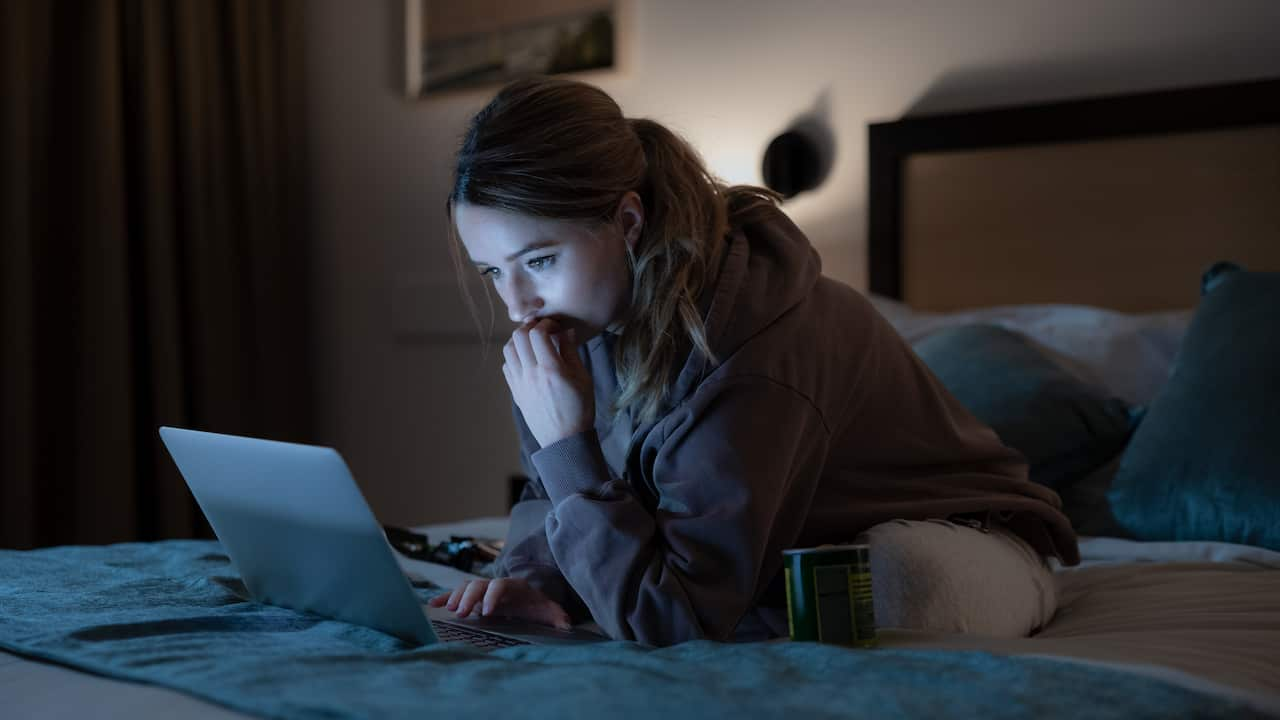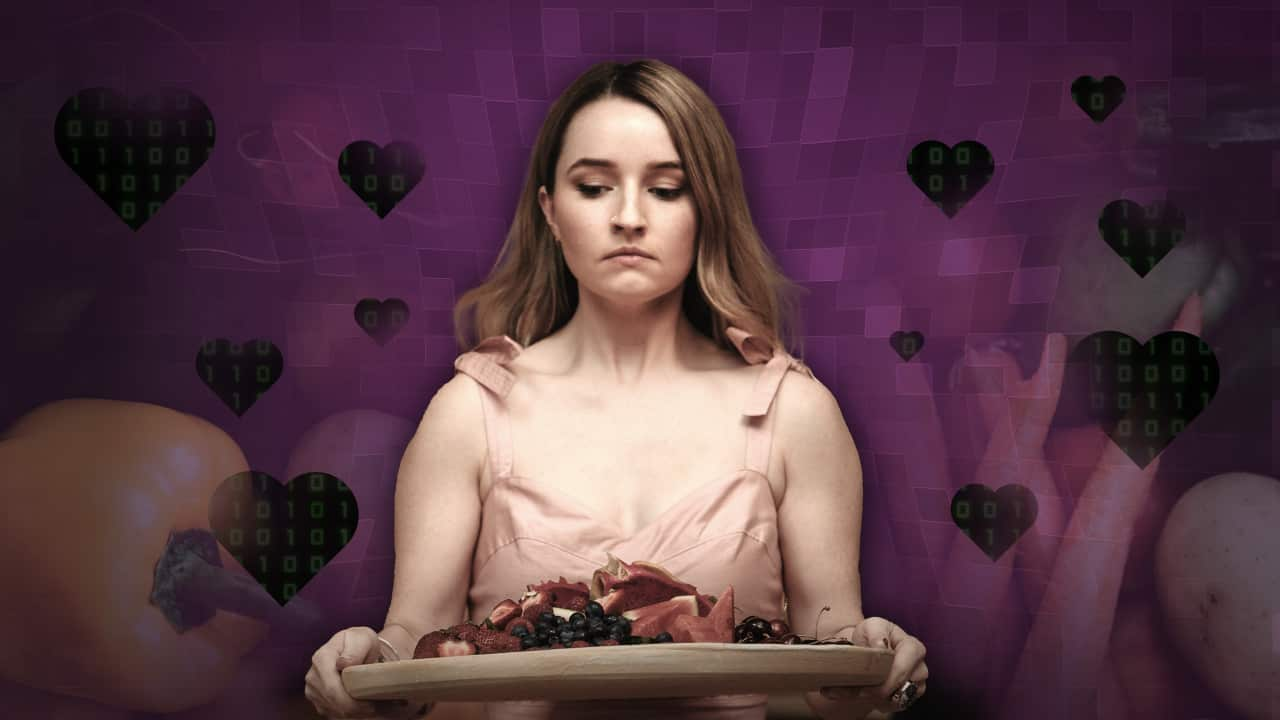It’s the wellness scam that gripped Australia. Belle Gibson through health, wellness and good old fruit and veges.
Only, she never actually had cancer in the first place.
Now, the infamous Australian wellness influencer turned cancer con woman is getting her own Netflix TV show — one that she’s had zero involvement in and won’t earn a cent from, according to Netflix.
Filmed in Melbourne and billed as being “inspired by a true story that was based on a lie”, Apple Cider Vinegar is a six-episode exploration of Gibson’s catastrophic rise and fall.
Kaitlyn Dever plays Australian cancer conwoman Belle Gibson as she rises in the wellness world — and eventually falls. Source: Supplied / Netflix
‘The discomfort is real’
Kaitlyn Dever (Booksmart, Dopesick) is a convincing Belle — with an equally convincing Australian accent — who brings more complexity to the character than you might think probable. While in real life, Gibson appears a largely irredeemable character to most people, Apple Cider Vinegar imagines what makes her tick — and the consequences of her lie.
“The character of Belle is our creation,” says show creator and award-winning Australian writer Samantha Strauss (Nine Perfect Strangers; Dance Academy).
I think she had a big hole inside. She wanted to feel love, never felt like she had enough love, yearned for approval.
Samantha Strauss, creator, Apple Cider Vinegar
“I was probably in danger of feeling way too empathetic for her all the time. You just put yourself in her shoes and imagine it from that point of view,” Strauss says.
She tells SBS News the sense of empathy she feels for Gibson is uncomfortable.
“The discomfort is real,” she says.
“That’s why a character like Lucy [a character in the series] is really important to us — whenever you went so far as to forgive and understand Belle, you would remember Lucy and the stakes of the story.”
Tilda Cobham-Hervey plays Lucy, a woman with breast cancer who is drawn to Milla Blake and Belle Gibson’s health claims. Source: Supplied / Netflix
Looking beyond the scam
The show is inspired by the 2017 book The Woman Who Fooled The World by Beau Donelly and Nick Toscano, the two young reporters who uncovered Gibson’s lie in a 2015 exposé for The Age.
Strauss says her decision to expand the story beyond the scam was an intentional choice to show the real-world damage Gibson caused.
Sydney-based actor Alycia Debnam-Carey (Fear The Walking Dead; The 100) plays Milla Blake, a young woman who refuses to amputate her cancer-riddled arm and who goes on to build a platform promoting the power of food to fight cancer.
The character appears to be based on writer and ‘wellness warrior’ Jessica Ainscough, who was diagnosed with epithelioid sarcoma at the age of 22 and passed away seven years later, in 2015.
SBS alumni Aisha Dee (The Bold Type; ) plays Milla’s close friend Chanelle, who is lured into Belle’s web of lies.
Meanwhile, Tilda Cobham-Hervey (The Lost Flowers of Alice Hart; Hotel Mumbai) tackles the character of Lucy, a woman with breast cancer who is hopefully drawn in by Milla and Belle’s claims. Nyikina man Mark Coles Smith (Mystery Road: Origin) plays Lucy’s husband, a journalist on a mission to uncover Belle’s secret.
“I didn’t want to glorify Belle and give her a six-episode biopic. This is a story about wellness, medicine, being a young woman, and living and dying,” Strauss says.
“You can’t tell Belle’s story without telling the real-life stakes of her story.”
From oncology wards to television sets
For Dever, playing Gibson was personal.
“My mum passed away last year from breast cancer and had a 14-15-year long battle with it,” she explains.
This story hits home for me in a deeper way than anything I’ve ever done.
Kaitlyn Dever, actor
“I was really appalled by the lies Belle told from a personal level and also really moved by the Milla storyline with her mother as well. I found it to be important storytelling and it is very personal to me,” Dever says.
For Kaitlyn Dever, her role in Apple Cider Vinegar was personal after losing her mother to breast cancer last year. Source: Supplied / Netflix
Dever says while the story itself is “very heartbreaking and sad”, the series weaves in lighter moments.
“It’s definitely such an emotional show and what Sam [Strauss] does so beautifully is tow that very fine line between sadness and drama and darkness and comedy and stylised shots and montages and things like that,” she says.
“I think it makes the show easy and the darker parts easier to digest.”
‘Really difficult to get doctors to believe you’
One of the threads the series tugs at is the gendered nature of healthcare: Even in facing cancer, women face inequality.
According to a comprehensive 2023 study from the United States-based Centre for Global Health, National Cancer Institute, women experience unequal power dynamics in cancer treatment settings, which can impede their access to timely and accurate diagnoses.
In accepting the role of Chanelle, Dee says she found the show’s themes of medical misogyny particularly resonant.
“As a woman trying to advocate for herself in the medical world, I think it can be really difficult to get doctors to believe when you say something is wrong,” she tells SBS News.
“Of course, I’ve lost loved ones and seen a lot of tragedy … [but] as well as being angry and emotional and sad, I also felt this weird sense of comfort in knowing that someone had so perfectly spoken to a feeling that I thought I was alone in.”
Australians Alycia Debnam-Carey and Aisha Dee say the series aims to tackle women’s experiences in the health field. Source: Supplied / Netflix
Two-thirds of Australian women have experienced healthcare-related gender bias or discrimination, according to a 2024 report from the Department of Health and Aged Care.
Soaked in pink and pulsing with Britney Spears tracks, Apple Cider Vinegar is unequivocally made for women. But it’s not merely aesthetic.
Along with addressing disparities women face in healthcare, the series also scrutinises the immense social pressure they’re subject to, even in the face of cancer.
Such pressure is at play when, in the series, Milla refuses an amputation of her cancer-ridden arm, Debnam-Carey says.
“It can be so easily dismissed by the doctors as vanity, but he’s also never been a young woman having to take away something so personal as an arm,” she says.
Strauss says: “She was a young woman. She was a type-A personality. She felt she needed to be beautiful, she needed to be perfect, to be good enough.”
“When she got sick, she felt like she did it to herself.”
“This story hits home for me in a deeper way than anything I’ve ever done,” actor Kaitlyn Dever says. Source: Supplied / Netflix
Deadly ramifications
Strauss has also had personal experiences in the oncology ward — and the misinformation that comes with the world of cancer.
“A lot of us have people who are going through chemotherapy right now and [know] how hard it is to show up for it, and how brutal it feels,” she says.
“A friend of mine is doing it right now, and you don’t know for years if it works or not. There’s no magic pill you can take. You just have to do these terrible things to your body.
“Then you read ‘facts’, like 90 per cent of oncologists would refuse chemotherapy if given the chance, which is not a real fact — it’s an ‘internet fact’.”
Experts say cancer patients face a “substantial risk” of exposure to misinformation or inaccurate information about cancer. This can vary from false information about cancer risk factors to unproven treatment options.
Unsurprisingly, the effects of this can be deadly.
for making and profiting from false medical claims and fraudulent donation claims.
“Belle Gibson sold a web of lies to vulnerable, desperate people — and thought she could get away with it,” Marlene Kairouz, consumer affairs minister at the time, said.
Her [Belle Gibson’s] actions were not only careless but also dangerous. Her book and app were targeted at people who had cancer and were looking for a ray of hope.
Marlene Kairouz, former consumer affairs minister
Debnam-Carey says the series’ appeal transcends the media furore that surrounded Gibson’s real-life story.
“I think a lot of people know someone who has gone through something like this. We all have connections to people who have suffered and have had that pain.
“It really shows how extraordinary Belle’s rise and fall from grace really is. The reach she had, the scale of destruction she left behind, it’s pretty overwhelming.”
